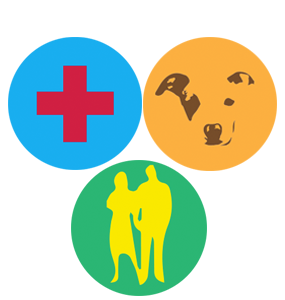

The role of our pets in our lives has certainly changed over the years. Dogs and cats have gone from largely utilitarian, or at least taken-for-granted positions as animals who lived in the yard, wandered the neighborhood and slept in a modest shelter, to family members that share our lives in many ways. They interact with our children and have assumed roles not just as companions but as pseudo siblings. Our pets live intimately with senior citizens, disabled and chronically ill family members and add greatly to the quality of life for the people who share their lives.
Once, pets were considered expendable… now, for most of us, they are virtually irreplaceable. The role of your veterinarian has evolved as well. In the not too distant past the veterinarian’s role was almost exclusively to intervene when pets were injured or sick. Today, veterinarians play a much greater role in the early detection and control as well as the prevention of disease. Veterinarians are also educators and they are dedicated to supporting you in sharing and enjoying your pet as long as possible. That means a visit to the veterinarian may look a lot different than it did in the past when intervention was more important and prevention and counseling played a lesser role.
When you go to your physician you will generally find that between nurses, PAs and the Physician you will spend as much time describing your complaints, discussing lifestyle issues and answering questions as you do in the course of the actual examination. The reason is a shift that has occurred from primarily illness intervention to early detection and prevention. These same changes have occurred in the way veterinarians provide healthcare to pets.
 Every question asked has a reason. Issues of nutrition, behavior, experience of discomfort as well as basic physical questions like water intake, toilet habits activity changes…all can be an indicator of subclinical problems or offer a course of exploration for clinical concerns. Some of these questions may seem misdirected, but they all link together and help ensure a clear direction.
Every question asked has a reason. Issues of nutrition, behavior, experience of discomfort as well as basic physical questions like water intake, toilet habits activity changes…all can be an indicator of subclinical problems or offer a course of exploration for clinical concerns. Some of these questions may seem misdirected, but they all link together and help ensure a clear direction.
Physical exams can be confusing. Just what is the doctor doing? Why is she not going directly to the problem like lameness or a rash or a mass? But it's important to remember that a physical exam must be conducted in a complete and methodical manner. Sometimes subtle physical findings can result in problems that seem unrelated. By being consistent, thorough and complete there is less likelihood of a missed finding.
Finally, we come to diagnostic tests from radiographs to tests for the presence of parasites to any number of blood tests that allow an evaluation of specific organ systems like kidneys, liver, blood sugar and even heart disease. The point of these tests is early diagnosis to allow for intervention that can support unhealthy organs or even return them to normal.
What can you do to help? It is important that you realize you are a part of the healthcare team. Start by coming prepared. Write down your questions and concerns about your pet’s health. What have you noticed that is out of the ordinary? That means you need to observe your pet for what is normal behavior so you can note abnormal behavior like changes in water intake, changes in frequency of urination, weight loss or weight gain.
Observe and understand the physical examination. What is the doctor feeling for, listening for or watching? If the doctor or technician does not explain it to your satisfaction… ASK!
As a side note, most diagnostic tests are done in groups or panels. The reasons are twofold: to gather as much information the first time as possible and, as strange as it may seem, to save you money over individual tests.
Once your veterinarian makes recommendations and plans, be sure you understand what your veterinarian is asking of you and be sure you follow through with the plan you agree to. Not adhering to the plan you make will jeopardize results, often cost more in the long run and will almost surely delay the best care for your pet.
If you have any questions or concerns, you should always visit or call your veterinarian – they are your best resource to ensure the health and well-being of your pets.
![]()
